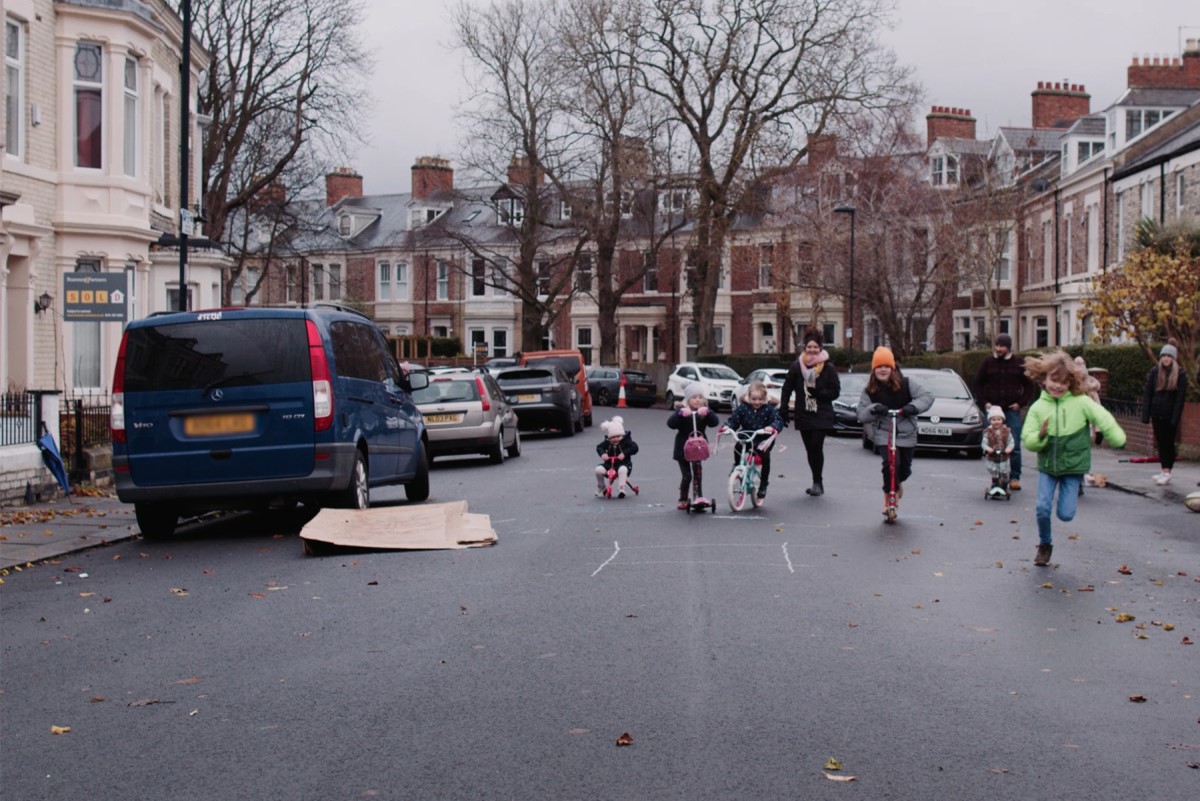Why England needs a national strategy for more - and safer - opportunities for children to play
25 January 2024 | By: Prof Alison Stenning | 3 min read
Resident-led play street sessions can reduce loneliness and lead to greater community cohesion.
In this blog post, Professor Alison Stenning advocates for increasing Play Street provision and safer opportunities for outdoor play in public spaces.
The decline of safe public spaces for play
The number of safe, public spaces where children and young people can engage in play on their terms in their own neighbourhoods has declined rapidly over the last decade or more. Where playgrounds, for example, do exist, they may not be maintained - or be age-appropriate for older children and teens. And many neighbourhoods themselves have become increasingly dominated by cars – too many, travelling too fast, and taking up too much space, marginalising children and their play still further.
As a result, children may have to navigate often dangerous and polluted roads to get to places that are away from where they live, or be reliant on parents – if a local park is a car ride away. This means they have fewer opportunities to play, and the space where they can play inevitably becomes a destination supervised by adults, rather than somewhere where children and young people can socialise with friends and peers, and engage in independent, and adventurous – even risky – play.
Outdoor play, access and equality
The Levelling Up, Housing and Communities Select Committee is currently looking at the role of outdoor play and issues around the equality of children and young people’s access to public spaces and the wider built environment. It is also examining what changes there have been in recent years to children’s lives outside, and to their level of freedom and independence.
I greatly welcome this: an increasing amount of evidence shows that playing out is good for children’s physical and mental health. Moreover, my research has shown that an increase in the number of resident-led play streets can reduce loneliness and lead to greater community cohesion, so I was pleased to be invited by the Committee to talk to them about my work in this area.
The impact of resident-organised playing out sessions
Research I carried out with Playing Out – the national, parent-led movement aimed at restoring children’s freedom to play out near their home – highlighted that resident-organised playing out sessions provide a way for children of different ages and from different schools to meet and play with each other, giving them a greater sense of belonging and that they have the same right to access and safely use the space as much as adults.
In my research, adults said that being part of playing out sessions on the street gave them the chance to make new intergenerational connections with neighbours of all ages, regardless of whether they had children. It brings neighbours and communities together: from taking part in some of the (child-led) activities, providing snacks and drinks, or acting as a steward to maintain the temporary closure of the road to traffic, it provides a way for children and adults alike to form new friendships.
These friendships often lead to the exchange of help and other support between neighbours. Residents also said that they say hello to their neighbours and stop to chat to them more often as a result of the new connections they have made.
Barriers to resident-led play initiatives
Too often though, responsibility and much of the work in organising neighbourhood playing out sessions falls to small groups of neighbours. And some people can be fearful of approaching their neighbours to initiate the temporary closure of their street to provide a safe space to play.
Local authorities should recognise and value the contribution of this resident-led, grassroots movement in helping tackle loneliness and disconnection in communities, and provide greater support for residents to establish and maintain playing out on their streets.
But many of them are barely coping after more than a decade of cuts in funding from central government.
Furthermore, local authorities do not currently have a statutory duty to provide or maintain play facilities in their area, and many don’t have a play strategy. But it is not clear where responsibility should be, whether it be the Department for Education or Department for Levelling Up, Housing and Communities or local authorities themselves. As a result, the provision of space to play and the support for residents who want to set up a play street in their community is not consistent.
Call for a comprehensive national strategy
A national cross-government strategy would provide a child-centred framework for local authorities and communities to work to. It could make the case for the importance of children and young people having space to play, move, and hang out in their neighbourhoods and encompass the built environment, planning legislation, transport and communities.
A Secretary of State for Children and Young People, separate from the Department for Education, could drive this agenda.
The breadth and diversity of evidence submitted to the Levelling Up, Housing and Communities Select Committee inquiry underlines the strength of feeling in communities, organisations and campaign groups across the country.
This is an extraordinary opportunity to make a change, to improve children and young people’s experiences in their built environments, for their benefit and ours.
You might also like
- our research on building strong communities through play
- read our press release: More support needed for play streets to tackle loneliness
- learn more about Professor Alison Stenning, Professor of Social and Economic Geography
- view Professor Stenning's written evidence and video evidence to the Children, Young People and the Built Environment - Levelling Up Committee Inquiry
- explore Geography at Newcastle University and its international reputation for excellence in geographical research and teaching